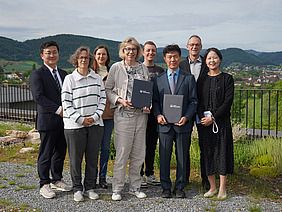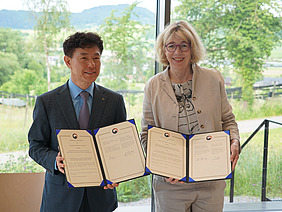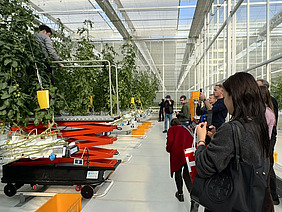(Frick, 28.05.2025) With a share of only around 2.4 percent, organic farming has remained marginal in South Korea. However, in light of climate change and a growing demand for organic products, the government wants to promote the sector in a targeted manner. Even so, the expansion faces numerous challenges, particularly when it comes to adapting organic farming methods to local conditions. In order to progress, South Korea is drawing on international knowledge exchange.
FiBL Switzerland and the South Korean NAS have been working together for ten years on projects to develop site-specific strategies. On May 28, 2025, the two institutions officially confirmed their collaboration by signing a Memorandum of Understanding, taking it to a new level. In the future, the exchange of knowledge will be even more intensive, with a particular focus on smart farming and climate farming.
Potential of organic in South Korea
South Korea has a very intensive agricultural sector with small and very specialised farms. These are often only one to three hectares in size, each with one main crop such as garlic, ginger, chili, ginseng, apples or cherries. Customers particularly value large and beautiful fruit and will pay the equivalent of six francs for an apple. However, many pesticides are currently used to produce these products.
Despite evident consumer demand for healthy and organically products in South Korea, the practical implementation of organic farming methods has so far been largely ineffective. FiBL sees the greatest opportunities for development in the introduction of adapted crop rotations, greater diversification of farms and the targeted promotion of organic plant protection measures.
Shared experiences in fruit growing
FiBL and South Korea have been carrying out joint projects in the field of fruit growing for ten years. The South Korean partners were the RDA and the Gyeongsangbuk-do Agricultural Research and Extension Services (GBARES). Topics included flower strips in apple production, apple varieties and biological plant protection strategies. The South Korean peninsula, with its hilly landscape, has similar climatic conditions to Central Europe. FiBL benefits from exchanging varieties and additional test areas for organic plant protection products, while South Korea benefits from FiBL's knowledge. Two further joint projects focusing on plant protection in stone fruit and on smart farming and climate farming are in preparation. In addition, South Korean students regularly work at FiBL as part of an exchange program.
Future prospects
The signing of the Memorandum of Understanding on May 28, 2025, marks an important milestone in the cooperation between South Korea and Switzerland. Hans-Jakob Schärer, Co-Head of the Plant Protection and Phytopathology Group at FiBL and responsible for cooperation with South Korea, says: "This partnership will not only improve agricultural practice in both countries, but also make an important contribution to global sustainability."
Further information
FiBL contacts
- Hans-Jakob Schärer, Co-leader of the Plant Protection Group, FiBL Switzerland
- Franziska Hämmerli, Media Spokesperson, FiBL Switzerland
Supporters/Donors
- State of South Korea
Partners
- National Institute of Agricultural Sciences NAS and Rural Development Administration (RDA)
- Gyeongsangbuk-do Agricultural Research and Extension Services (GBARES)
- Korean Agency of Education, Promotion and Information Service in Food, Agriculture, Forestry and Fisheries EPIS
Links
- orgprints.org: Article "An apple for eight francs" (in German)
- rda.go.kr: Website of the RDA
- fibl.org: Article "Together with Korea: Organic strategies for fruit growing"
- fibl.org: Article "FiBL and Korean Agency collaborate on promoting Smart Farming for organic agriculture"
- biomedia.picturepark.com: Further images






